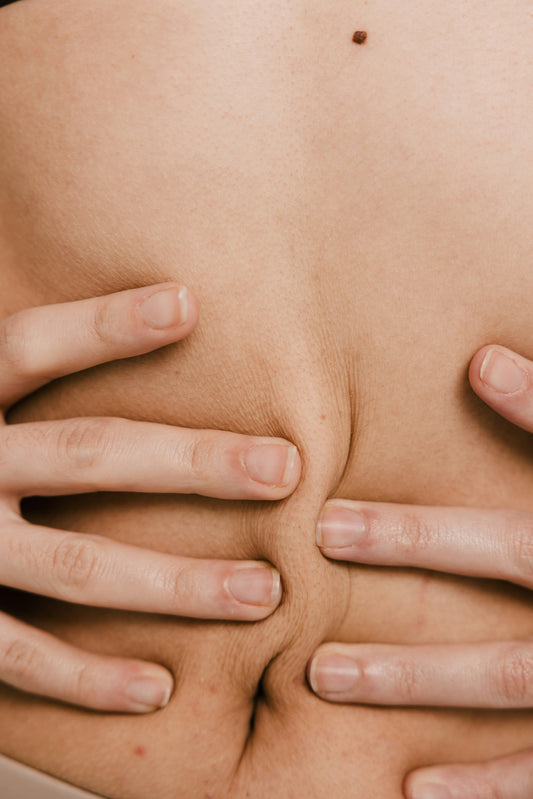
Vad det är och hur det påverkar dig
Hormonell obalans
Tänk dig det här: Du sitter på jobbet och försöker koncentrera dig på en viktig uppgift, men tankarna vandrar iväg. Ena stunden känner du dig oövervinnerlig, och nästa kämpar du mot tårarna över en gullig hundvideo på Instagram. Känns det igen? Det kan vara tecken på hormonell obalans.
Hormoner arbetar i det tysta för att hålla kroppen i balans, men när något rubbas kan det orsaka allt från humörsvängningar till problem med menscykeln, klimakteriet eller fertiliteten.
Hormonell obalans är ett vanligt problem som många kvinnor upplever i olika skeden av livet. Att förstå tecknen på hormonell obalans och veta hur du kan hantera dem naturligt kan göra stor skillnad.
5 tecken på Hormonell obalans
-
Oregelbunden mens
Oregelbundna menstruationer är ett av de vanligaste tecknen på hormonell obalans. Östrogen och progesteron är de huvudsakliga hormonerna som styr din menscykel, och när dessa är i obalans kan cykeln bli oförutsägbar. Det kan innebära allt från utebliven mens till kraftiga blödningar och svår PMS. -
Infertilitet och låg libido
Hormonell obalans kan ha stor påverkan på fertiliteten. Tillstånd som polycystiskt ovariesyndrom (PCOS), som kännetecknas av ett överskott av androgener, kan störa ägglossningen och göra det svårt att bli gravid. Låga nivåer av östrogen och testosteron kan dessutom minska sexlusten, vilket kan göra att försökstillfällena för att bli gravid blir färre. -
Humörsvängningar och Depression
Känner du att du åker en känslomässig berg- och dalbana? Ena stunden är du på topp, och i nästa ögonblick känns allt överväldigande. Hormonella obalanser kan ha en stor inverkan på vårt humör. Östrogen och progesteron påverkar serotoninnivåerna, som styr vårt välmående. När dessa hormoner är i obalans kan det resultera i känslor av ångest, irritation och nedstämdhet. -
Viktuppgång
Kämpar du med att få bort den envisa bukfettet trots alla magövningar? Hormoner som insulin och kortisol spelar en stor roll i ämnesomsättningen och fettlagring. När dessa hormoner är i obalans kan det leda till viktuppgång och göra det svårare att bli av med de extra kilona. -
Låg energi
Känner du att du behöver en tupplur för att orka med dagen? Hormonobalanser, särskilt i sköldkörtelhormoner kan göra att du känner dig helt utmattad. Om du ständigt är trött trots att du får tillräckligt med sömn kan det vara dags att kolla upp dina hormonnivåer.
Upprätthåll en balanserad kost
Maintain a Healthy Diet
Låt oss börja med det grundläggande: vad du äter spelar roll! En balanserad kost rik på obearbetade livsmedel kan göra underverk för dina hormonnivåer. Fokusera på att äta massor av frukt, grönsaker, magra proteiner och hälsosamma fetter. Livsmedel som avokado, nötter och fet fisk är särskilt bra på grund av sitt innehåll av hälsosamma fetter, som kan stödja hormonproduktionen.
Träna regelbundet
Regelbunden fysisk aktivitet är en riktig game-changer för hormonhälsan. Träning hjälper till att reglera insulinnivåerna och minska stress, två faktorer som är avgörande för att hålla hormonerna i balans. Sätt upp målet att träna minst 30 minuter om dagen. Ibland räcker en rask promenad, lyssna på kroppen och se vad som funkar för dig.
Stresshantering
Stress påverkar dina hormoner mer än du kanske tror. När du är stressad ökar nivåerna av kortisol, vilket kan störa balansen mellan andra hormoner. För att motverka detta kan aktiviteter som yoga, meditation eller djupandning hjälpa till att hålla dina hormoner i balans.4o mini
Få tillräckligt med sömn
Kvalitativ sömn är avgörande för hormonbalansen. Sikta på 7-9 timmars oavbruten sömn varje natt. Genom att skapa en regelbunden sömnrutin och en lugn miljö kan du förbättra sömnkvaliteten.
Drick vatten
Att dricka tillräckligt med vatten är avgörande för att hålla kroppen och hormonerna i balans.Sikta på att dricka åtminstone åtta glas vatten om dagen för att hjälpa kroppen att fungera optimalt.
Begränsa Intaget av Koffein och Alkohol
Både koffein och alkohol kan påverka hormonbalansen negativt. Försök att begränsa ditt intag av dessa ämnen och välj istället hälsosammare alternativ som örtteer eller vatten smaksatt med frukt.
Testa Mela Hormone Support
Hormone Support är utvecklat i samarbete med experter inom medicin och vetenskap. Vi strävar efter högsta möjliga kvalitet och effektivitet när det gäller våra kosttillskott. Varje ingrediens är noggrant utvald för sin bevisade förmåga att förbättra din hormonhälsa.
Slutsats
Hormonell obalans kan vara besvärligt, men det finns många naturliga sätt att hjälpa till att hålla dina hormoner i balans.
Genom att göra enkla livsstilsförändringar och lyssna på din kropps behov kan du ta kontroll över din hormonhälsa och förbättra ditt välbefinnande.
Kom ihåg att små, konsekventa insatser ofta leder till de största förbättringarna!
Referenser
- WebMD. (n.d.). "Mood Swings and Hormonal Imbalance". Retrieved from WebMD.
- Healthline. (n.d.). "Hormonal Imbalances in Women". Retrieved from Healthline.
- Mayo Clinic. (n.d.). "Hypothyroidism (underactive thyroid)". Retrieved from Mayo Clinic.
- National Sleep Foundation. (n.d.). "Hormones and Sleep". Retrieved from National Sleep Foundation.
- American College of Obstetricians and Gynecologists. (n.d.). "Menstrual Irregularities". Retrieved from ACOG.
- American Academy of Dermatology. (n.d.). "Hormonal Acne: Causes, Symptoms, and Treatment". Retrieved from AAD.
- Johns Hopkins Medicine. (n.d.). "Hormones and Digestive Health". Retrieved from Johns Hopkins Medicine.
- Harvard T.H. Chan School of Public Health. (n.d.). "Healthy Eating Plate". Retrieved from Harvard Health.
- Centers for Disease Control and Prevention. (n.d.). "Physical Activity Basics". Retrieved from CDC.
- American Psychological Association. (n.d.). "Stress Management". Retrieved from APA.
- National Institutes of Health. (n.d.). "Sleep Hygiene Tips". Retrieved from NIH.
- Medical News Today. (n.d.). "How Much Water Should You Drink?". Retrieved from Medical News Today.
- Cleveland Clinic. (n.d.). "Caffeine: How does it affect our health?". Retrieved from Cleveland Clinic.
- National Center for Complementary and Integrative Health. (n.d.). "Dietary Supplements: What You Need to Know". Retrieved from NCCIH.
Blog posts
Visa alla-

Upptäck probiotikan i Mela Hormone Support.
Det är ingen överraskning att många kvinnor som provar Mela Hormone Support märker skillnad i matsmältningen redan från start. Med 20 miljarder bakterier från 6 olika stammar hjälper dessa nyttiga...
Upptäck probiotikan i Mela Hormone Support.
Det är ingen överraskning att många kvinnor som provar Mela Hormone Support märker skillnad i matsmältningen redan från start. Med 20 miljarder bakterier från 6 olika stammar hjälper dessa nyttiga...
-

Hur Hormone Support kan Hjälpa med PCOS
PCOS (polycystiskt ovariesyndrom) drabbar miljontals kvinnor världen över och ger upphov till symptom som oregelbundna menstruationer, akne, viktökning och hormonell obalans. För att hantera dessa symptom krävs ofta ett holistiskt...
Hur Hormone Support kan Hjälpa med PCOS
PCOS (polycystiskt ovariesyndrom) drabbar miljontals kvinnor världen över och ger upphov till symptom som oregelbundna menstruationer, akne, viktökning och hormonell obalans. För att hantera dessa symptom krävs ofta ett holistiskt...
-

6 Enkla vanor för att förbättra dina PCOS symptom
Att hantera PCOS kan ibland kännas överväldigande, men sanningen är att små, konsekventa förändringar i din vardag kan göra stor skillnad. Det handlar om att bygga vanor som fungerar för...
6 Enkla vanor för att förbättra dina PCOS symptom
Att hantera PCOS kan ibland kännas överväldigande, men sanningen är att små, konsekventa förändringar i din vardag kan göra stor skillnad. Det handlar om att bygga vanor som fungerar för...




